Nowadays, there are so many great flour alternatives to suit a healthy lifestyle that it can even be overwhelming. This post will help clear up any confusion so you can stock your pantry with the best healthy flour substitutes to make every recipe nutritious!
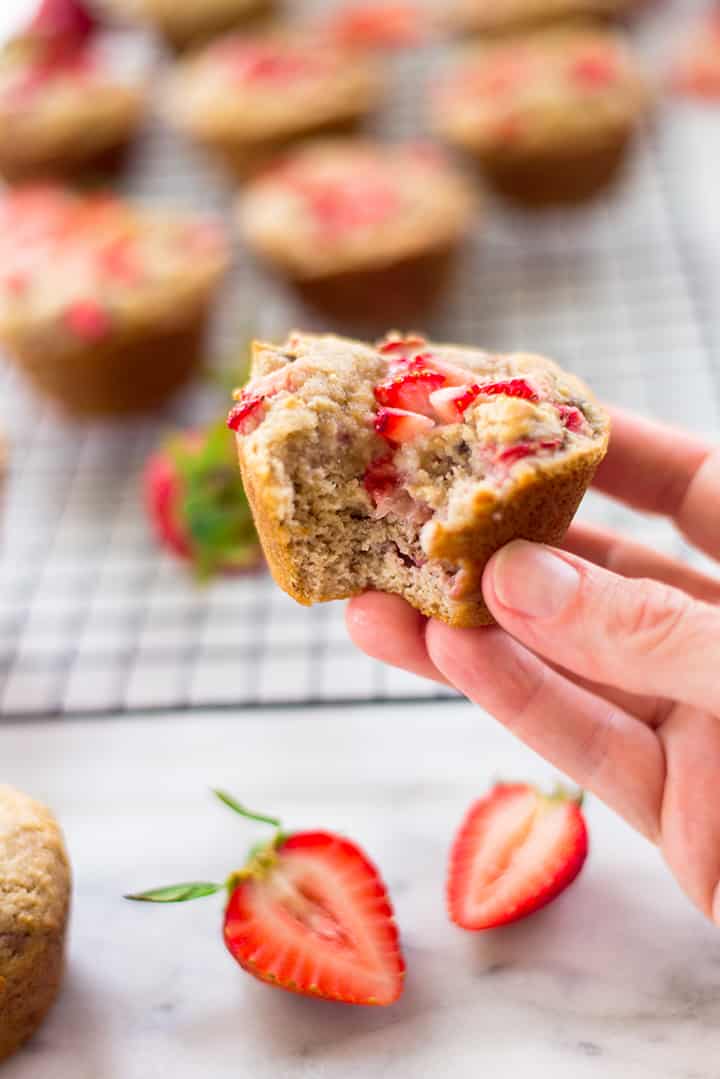
I enjoy a clean-eating lifestyle. I adopted this way of thinking and eating several years ago, and I have not looked back since.
It’s not that difficult – and it is worth the effort! I’ve lost weight (and kept it off), revamped my whole view on exercise, and look to the best foods to lose fat and build muscle. For those of you who have been following me for a while, you know that I am a big advocate of intermittent fasting, too.
Intermittent fasting has allowed me to take control of what I eat to make sure that I am putting healthy things in my body, giving the non-healthy stuff a toss. Sure, I enjoy a cheat day now and then when on holiday, and love a healthy cup of coffee. Coffee is healthy <–Yes!
I cook with the most nutritional foods I can and always look to swaps for the unhealthy foods. I switch out sugar for healthier options and add tons of veggies to my plate in place of side dishes like french fries.
So, in the case of flour, I choose the best alternative out there. When you use a healthy flour substitute, your food automatically becomes that much more nutritious.
The truth is that white flour is very limited in nutritional value. And, with better options out there, why not use more nutrient-dense options instead?
Let’s take a look at each one and see why they are better choices than white flour.
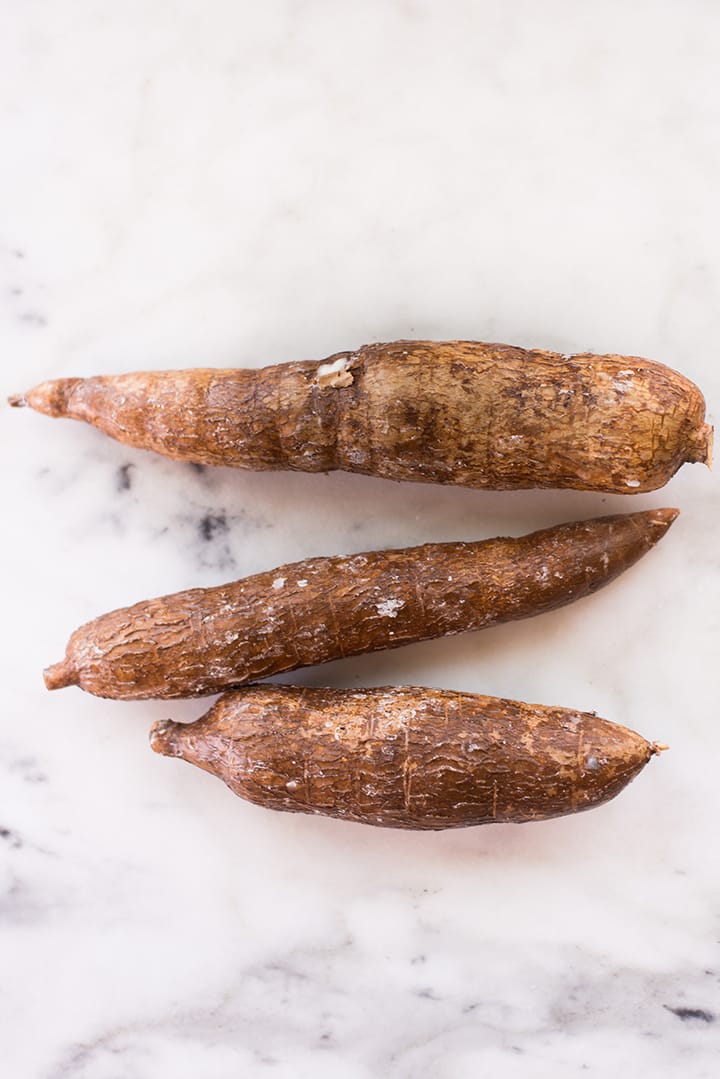
HEALTHY FLOUR SUBSTITUTES FOR THICKENING
I like arrowroot flour for thickening. What is arrowroot flour? It is harvested from the plant Maranta arundinacea and is gluten-free, grain-free, paleo-friendly, and vegan. So it’s pretty flexible for use in many cuisines. I use it more for thickening than I do for baking since it’s pretty starchy. It doesn’t leave a flavor (compared to cornstarch, which does).
The best thing of all though, is that arrowroot has iron, B vitamins, and potassium. And studies show that arrowroot is good for immunity.
Other possibilities to use as thickeners are:
- Tapioca starch, which is extracted from the cassava root, is wheat-free and gluten-free
- Ground flaxseeds are a source of omega-3 fatty acids
- Chia seeds can be used to thicken and have amazing benefits
WHAT IS A HEALTHY SUBSTITUTE FOR WHITE FLOUR?
I like spelt flour. It’s light and airy, and is from the same family as rye, wheat, and barley. Note that spelt is not gluten-free. But it does have health benefits:
- Spelt is high in fiber, important to disease prevention
- It has nutrients like iron, magnesium, and zinc and lots of vitamins
- It improves heart health
- Spelt is a grain, known to be great for digestive health
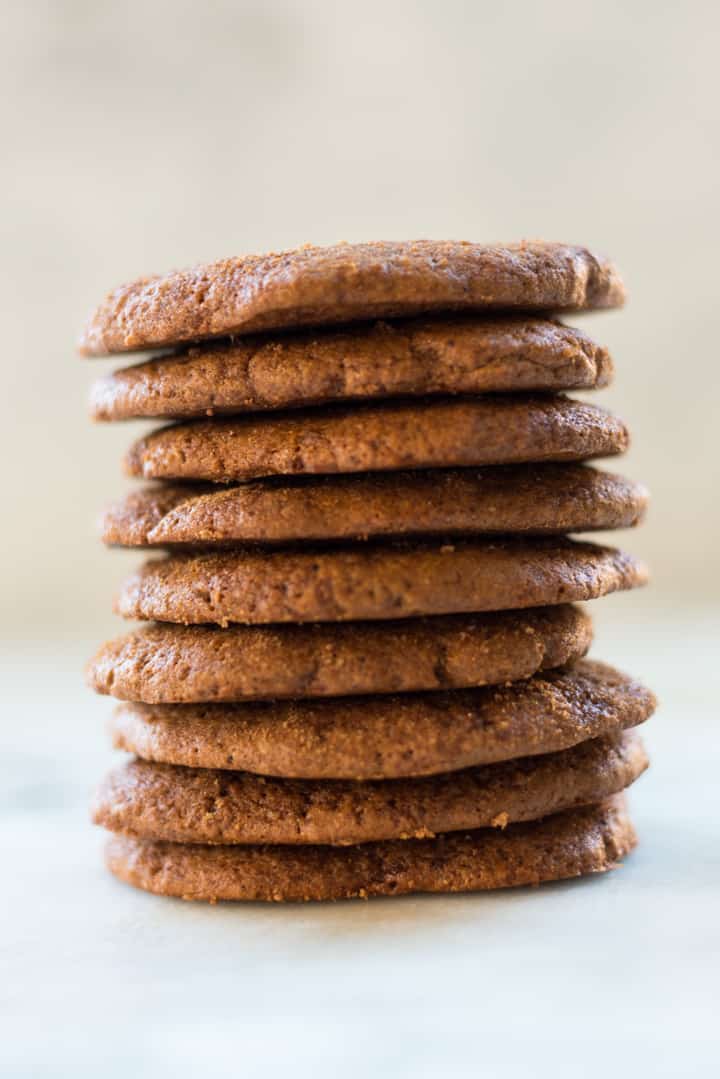
WHAT CAN I USE IF I DON’T HAVE WHITE FLOUR?
There are several options when you don’t have all purpose white flour and you need a swap that is almost the same. White all-purpose flour is a pretty common ingredient in many recipes. Go ahead and use these instead:
- Whole wheat flour (1:1 ratio)
- Whole wheat pastry flour (1:1 ratio)
- Spelt flour (1:1 ratio)
- Buckwheat flour (1:1 ratio)
CAN I REPLACE ALL PURPOSE FLOUR WITH ALMOND FLOUR?
You can replace all purpose flour with almond flour, but keep in mind that almond flour has no gluten. This means that your finished product may be flatter than you usually see, and the consistency will be denser, too.
Remember, there are two varieties used in baking:
- Almond flour: Almonds are blanched to remove the skin and then ground. Quick breads, cookies, and cakes turn out well when almond flour is used.
- Almond meal: Almond meal has a coarser texture than almond flour. Most of the time, the skins are left on the almonds before they are ground.
They work pretty equally in recipes, so I use these terms and ingredients pretty interchangeably.
DOES ALMOND FLOUR TASTE THE SAME AS WHITE FLOUR?
No, almond flour has a distinct taste. Almond flour is nutty and sweet. On the nutritional side, white flour is basically devoid of all nutrients and fiber because of the processing. Because almond flour has tons of nutrients, making it the better choice.
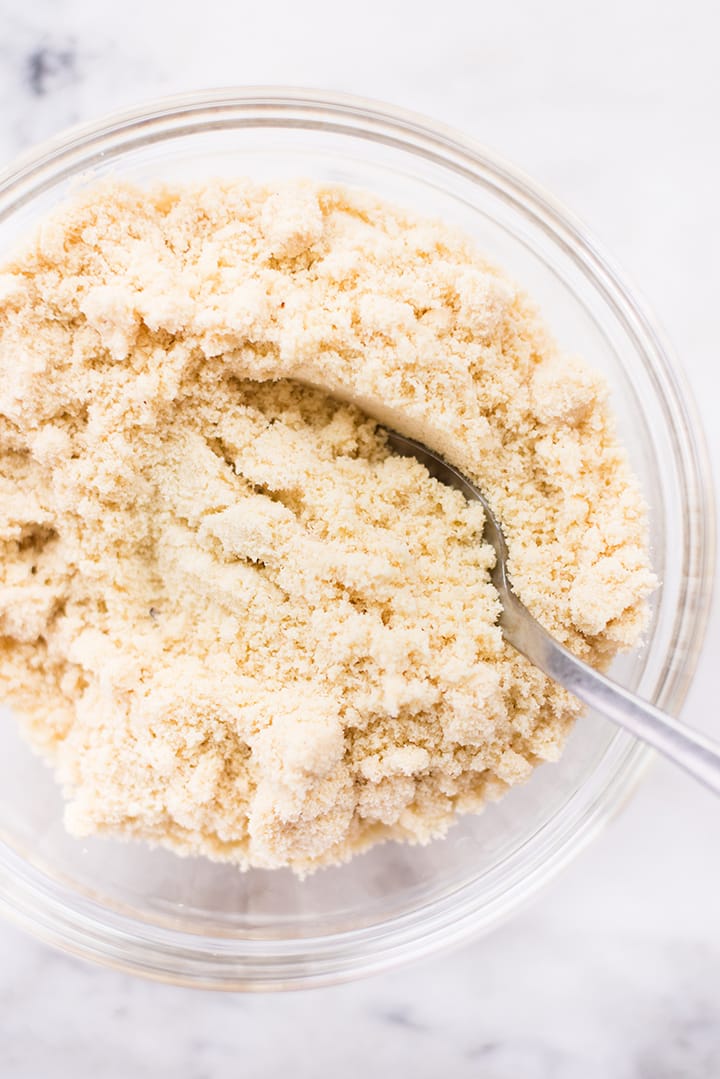
WHICH IS BETTER, COCONUT FLOUR OR ALMOND FLOUR?
Both of these flours have good points. Almond flour has vitamins and minerals like vitamin E, manganese, and phosphorous. The magnesium in almond flour is good for a ton of health reasons, including insulin resistance. (See more about nuts and your blood sugar levels in my post on the best foods to lower your blood pressure.) Almond flour is also thought to reduce bad (LDL) cholesterol.
Coconut flour has less fat, carbs, and calories than almond flour. But, it is higher in phytic acid than almond flour, which may reduce how many of the nutrients in what you are baking can be absorbed by the body.
BENEFITS OF HEALTHY FLOURS
White flour has all of the fibrous and nutritious parts removed during processing. Because white flour products are digested easily, they are considered high glycemic foods. Using healthy flours in place of refined white flour really is a smart decision and puts you one step closer to better health. Let’s look at the benefits of swapping white flour for healthy flour alternatives.
- Whole grain flours have lots of fiber due to the less-processed grain, and benefit the digestive system
- Spelt flour is a whole grain which can lower the risk of diseases like stroke
- Gluten-free flour allows those who are gluten-intolerant to enjoy baked goods but make sure the product is not overly-processed
- Many healthy flours are low in carbs
- Rye flour products fill you up, and the satiety factor works well for weight loss
- Black bean flour is full of fiber and iron
- Oat flours help lower cholesterol and have antidiabetic effects
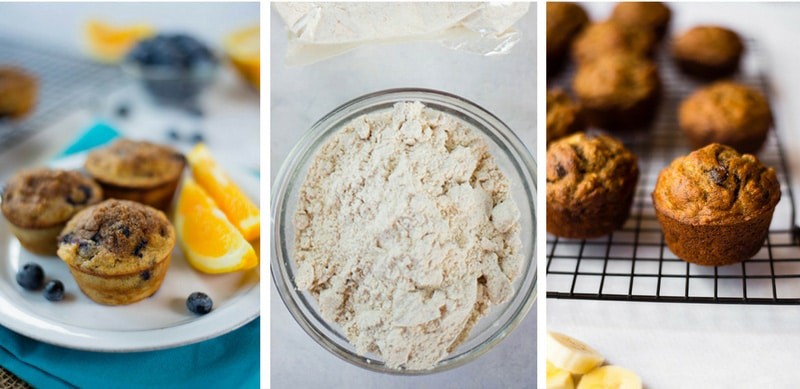
TOP HEALTHY FLOUR ALTERNATIVES
The great thing is, there are many alternatives out there. I’ve listed what I think are the best healthy flour substitutes, so give them a try.
1. SPELT
Spelt is a light flour, and although not gluten-free, it does have less than wheat flour does. This makes spelt flour easier to digest for those who may have problems with wheat. Spelt berries are the source of this ancient grain flour, which has lots of fiber. I use spelt flour in my Healthy Banana Chocolate Chip Muffins.
2. RYE FLOUR
Rye flour is lower on the glycemic index than white flour, meaning it digests more slowly in the body. This prevents spikes in blood sugar. Manganese and copper are found in rye flour, too.
3. WHOLE WHEAT FLOUR
Fiber-rich whole wheat flour is also high in protein. The ratio is 1:1 when working with white flour and whole wheat, but whole wheat is much higher in fiber because all parts of the wheat berry are whole (bran, germ, and endosperm). Whole wheat flours can change the texture of baked goods, which is nice when making something like homemade bagels.
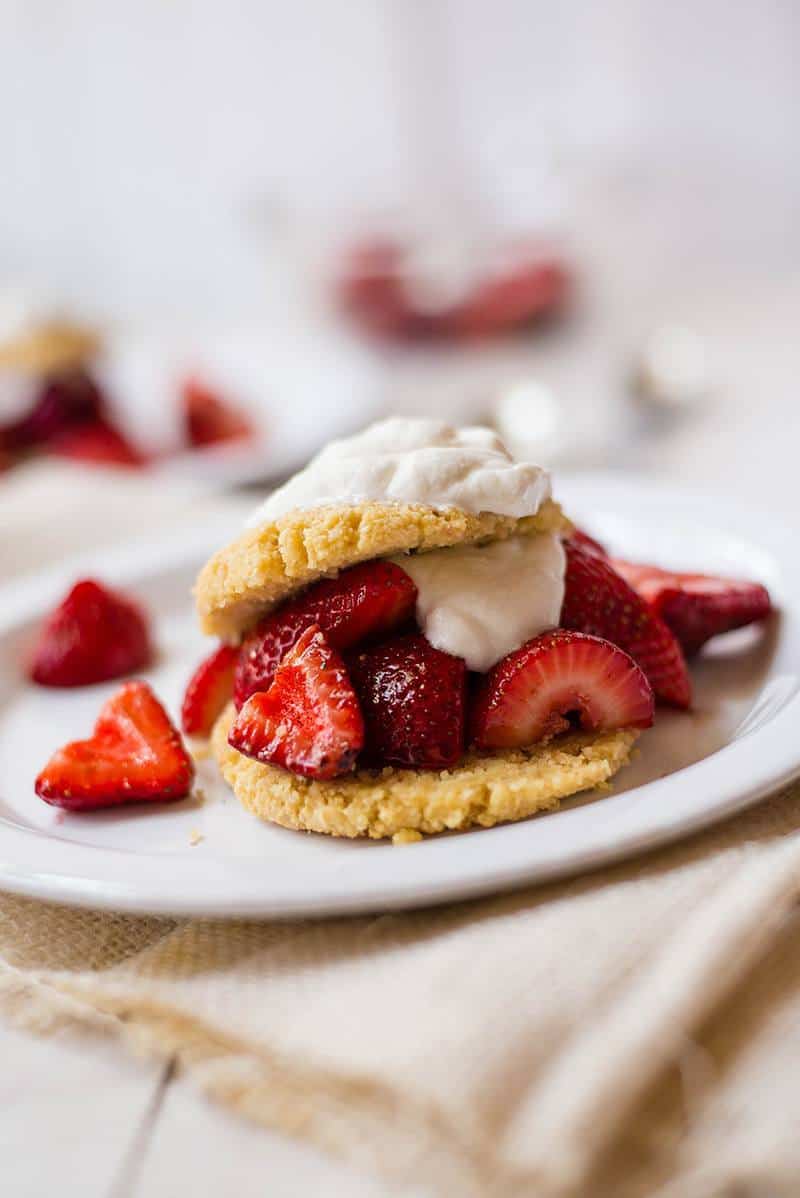
4. ALMOND FLOUR
What I like about almond flour is the presence of heart-healthy fats and the high protein content. Almond flour also provides triple the fiber that white flour does. The fact that it’s gluten-free is great, too. Baked goods will be denser than you are used to but using almond flour in a recipe like Gluten-free Strawberry Shortcake is just divine.
5. BROWN RICE FLOUR
Brown rice flour is another gluten-free option. It has manganese, which is important for immune system function and blood sugar regulation. Brown rice flour has a mild flavor but can possibly make baked goods brittle. Using applesauce or oil in the recipe is best.
6. COCONUT FLOUR
Coconut flour is made from ground and dried coconut meat. It’s a flour that provides a healthy dose of fiber. Coconut flour also contains saturated fat but is considered one of the healthy fat sources. Saturated fat in moderation is fine; just stay away from trans fats. You’ll also need to increase the liquid in your recipe when using coconut flour.

7. CASSAVA FLOUR
I love to make Cassava Flour Tortillas. Cassava flour makes the tortillas tender and chewy because it has a soft consistency. It’s gluten-free and has fiber, too. Cassava flour is also good in breading for fish because of its neutral flavor.
8. CHICKPEA FLOUR
I’ve got a great recipe for vegan Chickpea Flour Tortillas that I make often – and they only take 4 ingredients to make! Chickpeas are super healthy and excellent for the digestive system because of the soluble fiber they contain. Soluble fiber is proven to reduce the risk of colon cancer and other digestive system illnesses.
9. OAT FLOUR
Ground oats make up oat flour, which adds chewiness to baked goods. It’s easy to make at home by processing rolled oats in your food processor until they have the consistency of flour. Rolled oats have antioxidant and anti-inflammatory effects. Studies also show they even lower your cholesterol.
This post contains affiliate links to products I use regularly and highly recommend.
The post The 9 Best Healthy Flour Substitutes appeared first on A Sweet Pea Chef.
https://ift.tt/3l28nJrNowadays, there are so many great flour alternatives to suit a healthy lifestyle that it can even be overwhelming. This post will help clear up any confusion so you can stock your pantry with the best healthy flour substitutes to make every recipe nutritious!

I enjoy a clean-eating lifestyle. I adopted this way of thinking and eating several years ago, and I have not looked back since.
It’s not that difficult – and it is worth the effort! I’ve lost weight (and kept it off), revamped my whole view on exercise, and look to the best foods to lose fat and build muscle. For those of you who have been following me for a while, you know that I am a big advocate of intermittent fasting, too.
Intermittent fasting has allowed me to take control of what I eat to make sure that I am putting healthy things in my body, giving the non-healthy stuff a toss. Sure, I enjoy a cheat day now and then when on holiday, and love a healthy cup of coffee. Coffee is healthy <–Yes!
I cook with the most nutritional foods I can and always look to swaps for the unhealthy foods. I switch out sugar for healthier options and add tons of veggies to my plate in place of side dishes like french fries.
So, in the case of flour, I choose the best alternative out there. When you use a healthy flour substitute, your food automatically becomes that much more nutritious.
The truth is that white flour is very limited in nutritional value. And, with better options out there, why not use more nutrient-dense options instead?
Let’s take a look at each one and see why they are better choices than white flour.

HEALTHY FLOUR SUBSTITUTES FOR THICKENING
I like arrowroot flour for thickening. What is arrowroot flour? It is harvested from the plant Maranta arundinacea and is gluten-free, grain-free, paleo-friendly, and vegan. So it’s pretty flexible for use in many cuisines. I use it more for thickening than I do for baking since it’s pretty starchy. It doesn’t leave a flavor (compared to cornstarch, which does).
The best thing of all though, is that arrowroot has iron, B vitamins, and potassium. And studies show that arrowroot is good for immunity.
Other possibilities to use as thickeners are:
- Tapioca starch, which is extracted from the cassava root, is wheat-free and gluten-free
- Ground flaxseeds are a source of omega-3 fatty acids
- Chia seeds can be used to thicken and have amazing benefits
WHAT IS A HEALTHY SUBSTITUTE FOR WHITE FLOUR?
I like spelt flour. It’s light and airy, and is from the same family as rye, wheat, and barley. Note that spelt is not gluten-free. But it does have health benefits:
- Spelt is high in fiber, important to disease prevention
- It has nutrients like iron, magnesium, and zinc and lots of vitamins
- It improves heart health
- Spelt is a grain, known to be great for digestive health

WHAT CAN I USE IF I DON’T HAVE WHITE FLOUR?
There are several options when you don’t have all purpose white flour and you need a swap that is almost the same. White all-purpose flour is a pretty common ingredient in many recipes. Go ahead and use these instead:
- Whole wheat flour (1:1 ratio)
- Whole wheat pastry flour (1:1 ratio)
- Spelt flour (1:1 ratio)
- Buckwheat flour (1:1 ratio)
CAN I REPLACE ALL PURPOSE FLOUR WITH ALMOND FLOUR?
You can replace all purpose flour with almond flour, but keep in mind that almond flour has no gluten. This means that your finished product may be flatter than you usually see, and the consistency will be denser, too.
Remember, there are two varieties used in baking:
- Almond flour: Almonds are blanched to remove the skin and then ground. Quick breads, cookies, and cakes turn out well when almond flour is used.
- Almond meal: Almond meal has a coarser texture than almond flour. Most of the time, the skins are left on the almonds before they are ground.
They work pretty equally in recipes, so I use these terms and ingredients pretty interchangeably.
DOES ALMOND FLOUR TASTE THE SAME AS WHITE FLOUR?
No, almond flour has a distinct taste. Almond flour is nutty and sweet. On the nutritional side, white flour is basically devoid of all nutrients and fiber because of the processing. Because almond flour has tons of nutrients, making it the better choice.

WHICH IS BETTER, COCONUT FLOUR OR ALMOND FLOUR?
Both of these flours have good points. Almond flour has vitamins and minerals like vitamin E, manganese, and phosphorous. The magnesium in almond flour is good for a ton of health reasons, including insulin resistance. (See more about nuts and your blood sugar levels in my post on the best foods to lower your blood pressure.) Almond flour is also thought to reduce bad (LDL) cholesterol.
Coconut flour has less fat, carbs, and calories than almond flour. But, it is higher in phytic acid than almond flour, which may reduce how many of the nutrients in what you are baking can be absorbed by the body.
BENEFITS OF HEALTHY FLOURS
White flour has all of the fibrous and nutritious parts removed during processing. Because white flour products are digested easily, they are considered high glycemic foods. Using healthy flours in place of refined white flour really is a smart decision and puts you one step closer to better health. Let’s look at the benefits of swapping white flour for healthy flour alternatives.
- Whole grain flours have lots of fiber due to the less-processed grain, and benefit the digestive system
- Spelt flour is a whole grain which can lower the risk of diseases like stroke
- Gluten-free flour allows those who are gluten-intolerant to enjoy baked goods but make sure the product is not overly-processed
- Many healthy flours are low in carbs
- Rye flour products fill you up, and the satiety factor works well for weight loss
- Black bean flour is full of fiber and iron
- Oat flours help lower cholesterol and have antidiabetic effects

TOP HEALTHY FLOUR ALTERNATIVES
The great thing is, there are many alternatives out there. I’ve listed what I think are the best healthy flour substitutes, so give them a try.
1. SPELT
Spelt is a light flour, and although not gluten-free, it does have less than wheat flour does. This makes spelt flour easier to digest for those who may have problems with wheat. Spelt berries are the source of this ancient grain flour, which has lots of fiber. I use spelt flour in my Healthy Banana Chocolate Chip Muffins.
2. RYE FLOUR
Rye flour is lower on the glycemic index than white flour, meaning it digests more slowly in the body. This prevents spikes in blood sugar. Manganese and copper are found in rye flour, too.
3. WHOLE WHEAT FLOUR
Fiber-rich whole wheat flour is also high in protein. The ratio is 1:1 when working with white flour and whole wheat, but whole wheat is much higher in fiber because all parts of the wheat berry are whole (bran, germ, and endosperm). Whole wheat flours can change the texture of baked goods, which is nice when making something like homemade bagels.

4. ALMOND FLOUR
What I like about almond flour is the presence of heart-healthy fats and the high protein content. Almond flour also provides triple the fiber that white flour does. The fact that it’s gluten-free is great, too. Baked goods will be denser than you are used to but using almond flour in a recipe like Gluten-free Strawberry Shortcake is just divine.
5. BROWN RICE FLOUR
Brown rice flour is another gluten-free option. It has manganese, which is important for immune system function and blood sugar regulation. Brown rice flour has a mild flavor but can possibly make baked goods brittle. Using applesauce or oil in the recipe is best.
6. COCONUT FLOUR
Coconut flour is made from ground and dried coconut meat. It’s a flour that provides a healthy dose of fiber. Coconut flour also contains saturated fat but is considered one of the healthy fat sources. Saturated fat in moderation is fine; just stay away from trans fats. You’ll also need to increase the liquid in your recipe when using coconut flour.

7. CASSAVA FLOUR
I love to make Cassava Flour Tortillas. Cassava flour makes the tortillas tender and chewy because it has a soft consistency. It’s gluten-free and has fiber, too. Cassava flour is also good in breading for fish because of its neutral flavor.
8. CHICKPEA FLOUR
I’ve got a great recipe for vegan Chickpea Flour Tortillas that I make often – and they only take 4 ingredients to make! Chickpeas are super healthy and excellent for the digestive system because of the soluble fiber they contain. Soluble fiber is proven to reduce the risk of colon cancer and other digestive system illnesses.
9. OAT FLOUR
Ground oats make up oat flour, which adds chewiness to baked goods. It’s easy to make at home by processing rolled oats in your food processor until they have the consistency of flour. Rolled oats have antioxidant and anti-inflammatory effects. Studies also show they even lower your cholesterol.
This post contains affiliate links to products I use regularly and highly recommend.
The post The 9 Best Healthy Flour Substitutes appeared first on A Sweet Pea Chef.
Lacey Baier